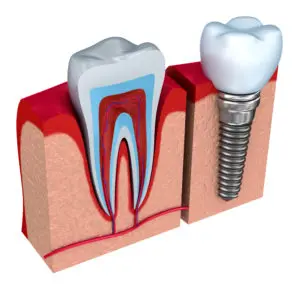When can I return to work after dental implant surgery?


What makes dental implants unique?
Compared to traditional tooth replacement methods, dental implants are quite different. While dentures and bridges address the loss of the crowns of teeth, they do not replace a tooth’s roots. By overlooking the structure of teeth under the gums, patients tend to develop bone atrophy, which can substantially change the shape of the mouth and even lead to further tooth loss. A dental implant, however, will replace the roots of teeth with a biocompatible titanium base. Embedded into the jaw by an oral surgeon, bone will eventually fuse around the titanium base to stabilize it. After the bone stabilizes an implant, a prosthetic will be attached to complete the restoration of a lost tooth. Dental implants function very much like natural teeth. They are not removed for overnight soaking like dentures; instead they are cared for by brushing and flossing.
Who is a candidate for dental implants?
Anyone who has lost one or more teeth should consult with dental professionals about dental implants. This is because dental implants support the entire oral health system and are the closest alternative to natural teeth available. Some health conditions and lifestyle choices can affect a patient’s candidacy for implants such as gum disease, diabetes, and smoking.
If you are interested in evaluating your tooth replacement options, we invite you to schedule a consultation with our team at Great River Oral & Maxillofacial Surgery.